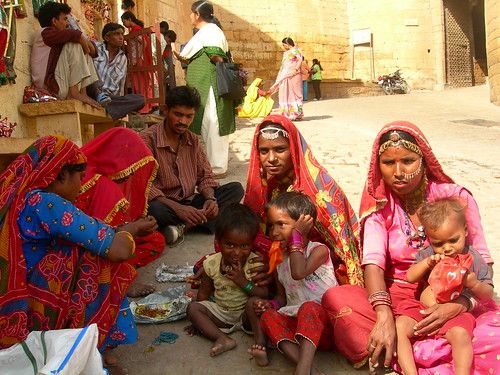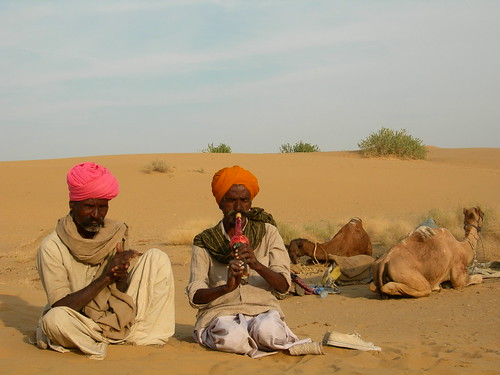Nomads in all castes and colors... (Jaisalmer part 2)
Trying to understand caste in India is a complicated business. Primarily, caste is a signifier of vocation (and a certain amount of cleanliness/sacredness that accompanies any job). Many of the nomads in Rajasthan are not pastoral nomads and keep very few, if any, animals. Instead, they used to travel from town to town providing skills and services to villages.
 Here are some of the caste groups I met in my first few weeks
Here are some of the caste groups I met in my first few weeks
(and their corresponding jobs):
Bhopa: Musicians who specialize in the teller of Pabu-ji, a famous Rajasthni epic. (Not to be confused with bopa - higher caste priests who do puja at particular temples)
Banjara: larger category of small goods traders. Originally engaged in trading salt, natural dyes, and minerals. Now mainly sell plastic goods, jewelry and bangles.
Godolia Luhars: iron smiths (the most common type of tool makers/repairers) They travel with great wooden carts and can manifest as anything from a full mobile iron melting and smithing unit to an old man with a sharpening wheel powered by a bicycle.
Ghattiwals: repair stone mills
(Kuch) Bandiya: make tools for goldsmiths, painters and weavers
Nat: Acrobats and performers of various feats and tricks (not to be confused with Naths - fire priests from Bikaneerwho do not wander) often magicians, contortionists, and tight rope walkers.
Bhatts: A large category encompassing different types of wandering storytellers and geneologists. (not to be confused with bhats)
Kathputli Bhatts: Puppeteers and singers. Perform with plays with marionettes on portable stages accompanied by musicians on dholok (drum), khartel (castenetes) and vocals.
Jogi: Wandering beggers with no special vocation. They are considered by some to be cast-out asetics and considered by some to be Kalbelias from another region. Untouchables
Kalbelias: Snake charmers, beggers, dancers, singers. They are connected to Jogis in ancestry (according to some, contested by others). Touted as the epic "real gypsies" of Rajasthan. Mostly, the women wander through towns begging and engaging in serious "flirtation/seduction" for money. Untouchables
Raika and Rebari: Pastoral nomads, herders of camel, sheep and goats. Sometimes considered one group, sometimes considered two separate groups. These days most herderes who call themselves Raika travel in Rajasthan, while most Rebaris are found in Gujarat and MP.

In the face of so much difference and diversity, I find myself constantly questioning any connection at all between these communities and the terms used to link them. North Indians I have met along the way fluctuate between lumping all of these communities under one inaccurate caste name (usually calling them all Jogis with thinly veiled contempt) or saying that these groups have nothing in common with each other. Still others were adamant that these groups even exist anymore. Indeed, other than their own landlessness and incessant movement, the various nomadic castes of Rajasthan do not have much in common. It is primarily when settling (most often in slums or on the outskirts of larger town/cities) that these groups have begun to mix and live in close proximity.
I very quickly had to accept the clear fact that almost none of the traditional nomadic castes in Rajasthan are still moving from place to place. Aside from the Raika and other pastoralists and small groups of banjari (small goods traders), virtually everyone has settled in one way or another. Many have settled in or around towns and cities where they can live off manual labor, low service work or beg or perform for tourists. By the time I come into contact with some Raikas and learn more about their communities, it is no longer possible for me to travel with them for a host of reasons. Only one of which is that it is copletly the wrong time of year to join a migration. Only the Raikas who do short term migration or radial migration (and live in hamlets) are around in Pali. Please come back in July, they say. Everyeon will be returning before the rains. Or come in October. Come back, come back. But by then I’ve been in Rajasthan for almost two months getting lost in other neighborhoods and tied to other families. Compared to Fulli and Suman and my other Bhopa sisters, these Raika men look quiet, reserved and hungry.
So, my time in Jaisalmer passes with a schizophrenic mixture of discomfort, annoyance, joy and ease. I find a room in a family run guest house near the musicians' colony and away from the fort and most of the tourists. I keep thinking that things will become clearer any day and that I will be able to leave soon enough...
 Here are some of the caste groups I met in my first few weeks
Here are some of the caste groups I met in my first few weeks (and their corresponding jobs):
Bhopa: Musicians who specialize in the teller of Pabu-ji, a famous Rajasthni epic. (Not to be confused with bopa - higher caste priests who do puja at particular temples)
Banjara: larger category of small goods traders. Originally engaged in trading salt, natural dyes, and minerals. Now mainly sell plastic goods, jewelry and bangles.
Godolia Luhars: iron smiths (the most common type of tool makers/repairers) They travel with great wooden carts and can manifest as anything from a full mobile iron melting and smithing unit to an old man with a sharpening wheel powered by a bicycle.
Ghattiwals: repair stone mills
(Kuch) Bandiya: make tools for goldsmiths, painters and weavers
Nat: Acrobats and performers of various feats and tricks (not to be confused with Naths - fire priests from Bikaneerwho do not wander) often magicians, contortionists, and tight rope walkers.
Bhatts: A large category encompassing different types of wandering storytellers and geneologists. (not to be confused with bhats)
Kathputli Bhatts: Puppeteers and singers. Perform with plays with marionettes on portable stages accompanied by musicians on dholok (drum), khartel (castenetes) and vocals.
Jogi: Wandering beggers with no special vocation. They are considered by some to be cast-out asetics and considered by some to be Kalbelias from another region. Untouchables
Kalbelias: Snake charmers, beggers, dancers, singers. They are connected to Jogis in ancestry (according to some, contested by others). Touted as the epic "real gypsies" of Rajasthan. Mostly, the women wander through towns begging and engaging in serious "flirtation/seduction" for money. Untouchables
Raika and Rebari: Pastoral nomads, herders of camel, sheep and goats. Sometimes considered one group, sometimes considered two separate groups. These days most herderes who call themselves Raika travel in Rajasthan, while most Rebaris are found in Gujarat and MP.

In the face of so much difference and diversity, I find myself constantly questioning any connection at all between these communities and the terms used to link them. North Indians I have met along the way fluctuate between lumping all of these communities under one inaccurate caste name (usually calling them all Jogis with thinly veiled contempt) or saying that these groups have nothing in common with each other. Still others were adamant that these groups even exist anymore. Indeed, other than their own landlessness and incessant movement, the various nomadic castes of Rajasthan do not have much in common. It is primarily when settling (most often in slums or on the outskirts of larger town/cities) that these groups have begun to mix and live in close proximity.
I very quickly had to accept the clear fact that almost none of the traditional nomadic castes in Rajasthan are still moving from place to place. Aside from the Raika and other pastoralists and small groups of banjari (small goods traders), virtually everyone has settled in one way or another. Many have settled in or around towns and cities where they can live off manual labor, low service work or beg or perform for tourists. By the time I come into contact with some Raikas and learn more about their communities, it is no longer possible for me to travel with them for a host of reasons. Only one of which is that it is copletly the wrong time of year to join a migration. Only the Raikas who do short term migration or radial migration (and live in hamlets) are around in Pali. Please come back in July, they say. Everyeon will be returning before the rains. Or come in October. Come back, come back. But by then I’ve been in Rajasthan for almost two months getting lost in other neighborhoods and tied to other families. Compared to Fulli and Suman and my other Bhopa sisters, these Raika men look quiet, reserved and hungry.
So, my time in Jaisalmer passes with a schizophrenic mixture of discomfort, annoyance, joy and ease. I find a room in a family run guest house near the musicians' colony and away from the fort and most of the tourists. I keep thinking that things will become clearer any day and that I will be able to leave soon enough...
1 Comments:
top [url=http://www.c-online-casino.co.uk/]uk casinos[/url] brake the latest [url=http://www.casinolasvegass.com/]casino online[/url] autonomous no consign hand-out at the leading [url=http://www.baywatchcasino.com/]casino games
[/url].
Post a Comment
<< Home